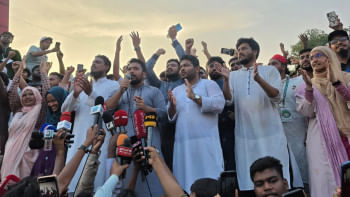Studying abroad: Coping with the norms of western freedom

Fahim Rahman Aunik and Saqlaen Utsha were young Bangladeshi students living in Australia who died in a fatal car crash three years ago. It is believed they were racing on the street at very high speed, when one of the cars collided against a power pole. The police described the car to have "disintegrated", such was the force of the collision. Both of them were from middle class families in Dhaka.
The cases of Aunik and Utsha were tragic and, thankfully, rare. Few international students suffer such tragic ends.
But I raise their example as an illustration of tensions many Bangladeshi students face when confronted with the sudden freedoms available in the west.
Tens of thousands of Bangladeshis travel overseas each year to study, and often use it as a path for more permanent migration to western countries such as Australia, Britain, USA and Canada. I have several relatives who have embarked on the same path.
The rapid growth in the number of Bangladeshi migrants in Australia in the past two decades has been built upon international students, helping to make tertiary education one of the key export industries.
But I have also observed the great challenges students face in my patients during practice and through interactions in the Bangladeshi community.
Few have a sense of the difficult lives that they must lead, combining study and long hours of work, often overnight in petrol stations. There is usually great financial pressure on the families back in Bangladesh, many of whom must sell their property to fund the tuition.
Most Bangladeshis have relatively poor English on arrival and struggle through their studies, often failing. The vast majority do not always realise their degrees are from lower tier universities or technical colleges. Many do not find jobs in their chosen field of study such as computing or accounting. If you take an Uber in Sydney or Melbourne, chances are the driver will be a Bangladeshi who first came to Australia as an international student but was unable to find more skilled work.
Most remain happy that they were able to gain permanent residency regardless.
One area that most students are completely unprepared for are domestic tasks. Few have never cooked a meal, cleaned their room or ironed their clothes. They had servants in Bangladesh. I have observed many students become sick from the terrible diets they consume, forever eating cheap take away food because they have no cooking skills. My mother has often cooked an entire week's worth of food for our student relatives.
Parenting styles in Bangladesh do not encourage autonomy or independence, especially for sons.
This is predicated on the tradition of sons marrying and then continuing to live in the family home. The vast bulk of Bangladeshi men, myself included, are raised as "mama's boys" where they are held aloft on a pedestal by their mothers as exceptional. They are then faced with uncertainty and challenges when they are thrust into the real world and realise they are not so exceptional after all.
The philosophy begins at birth. Attachment parenting where babies sleep with the mother remains common. This is an interesting contrast to Western parenting where immediate emphasis is placed on building independence. Babies are kept in their cots and left alone to sleep, a practice known as "controlled crying". This will seem harsh to many Bangladeshis.
Danish psychologist Nicolai Sennells has worked with Muslim immigrants in Scandinavia and commented on how pressures to conform among traditional communities such as Bangladeshis tend to come later in life. There are greater parental expectations and intervention regarding marriage and career.
The problem with modern life, as illustrated by international students, is that many go abroad before learning important life skills, especially how to live independently and navigate freedom.
In Australia, some become very drunk because they do not know how to manage alcohol. Others get into trouble because they misinterpret signals from western women. Many become depressed and even suicidal but find it difficult to ask for help under the cultural pressures of honour, or "shomman".
The vast majority do adjust and lead happy, prosperous lives in the west. But I'd also argue that despite our cultural emphasis on academic application, the lack of skills for independence and practical living limits our rise in western workplaces, where there is a need for initiative and leadership.
Migration abroad will remain a mainstay for Bangladesh, a country which despite its considerable progress cannot account for the aspirations of such a large mass of humanity. But its migrants in all forms, especially international students, will be better placed if they are aware of their limitations in social development.

 For all latest news, follow The Daily Star's Google News channel.
For all latest news, follow The Daily Star's Google News channel. 



Comments